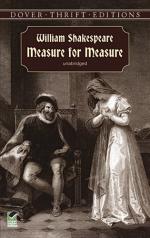|
This section contains 9,563 words (approx. 32 pages at 300 words per page) |

|
SOURCE: Taylor, Mark. “Farther Privileges: Conflict and Change in Measure for Measure.” Philological Quarterly 73, no. 2 (spring 1994): 169-93.
In the following essay, Taylor presents a psychoanalytic examination of the major characters in Measure for Measure—the Duke, Isabella, and Angelo.
At the end of Shakespeare's Measure for Measure the Duke, a man not “much detected for women,” as he said of himself earlier, suddenly proposes marriage to Isabella, a woman not much detected for men. Very little in the play has overtly prepared the reader or spectator for the Duke's expression of romantic interest; nor are there explicit indications how Isabella should, or does, respond to the offer. She is silent, but does her silence show acceptance or rejection of the proposal, mute delight at being chosen by the ruler of Vienna or smoldering indignation that her commitment to the celibate life should be taken so lightly? But the...
|
This section contains 9,563 words (approx. 32 pages at 300 words per page) |

|


